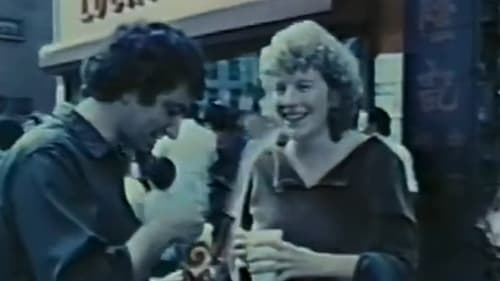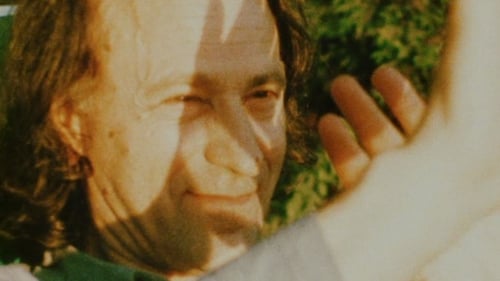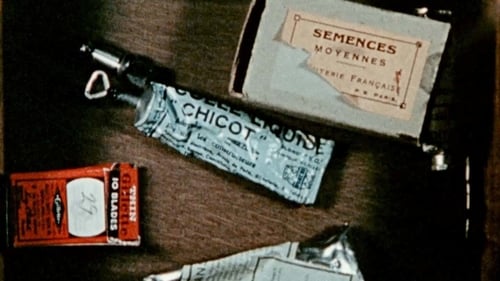Robert Breer
Nascimento : 1926-09-30, Detroit, Michigan, USA
Morte : 2011-08-11
História
Born in 1926 in Detroit, Robert Breer has spent fifty years building up a totally atypical body of work which plays with different genres and abolishes the notions of space and time.
Starting off as a painter, he then deconstructed his neoplastic works and ended up with kinetic objects. He dealt next with the thresholds of awareness and perception, both as a sculptor and a film-maker. His films are composed of a jumble images that pass at great speed, while his Floats move almost imperceptibly, in accordance with an unpredictable logic.
Robert Breer developed his light yet rigorous style while associating with the New York underground in the Pop years. Continuing his subtle exploration movement, he still today causes the space of reality-irrevocably unstable-to waver.

Himself
Experimental filmmaker Pip Chodorov traces the course of experimental film in America, taking the very personal point of view of someone who grew up as part of the experimental film community.

Director
Robert Breer’s What Goes Up... continues his “kitchen sink” approach of including as many different kinds of things as possible. Central to his art are a series of tensions. Rather than using animation to produce seamless illusions, his films reveal cinema’s dual nature as both an illusion of movement and a succession of stills. The ultimate effect of his work is ecstatic: by combining various rhythmic patterns, abstract and photographed shapes, and flatness mixed with depth illusions, Breer energizes ordinary eyesight. The whole world can seem more alive, alive with rhythms and colors and shapes and textures as well, after seeing one of his films. But Breer’s films also often have a theme of failure, of failed movements and failed aspirations, and the title What Goes Up..., in referencing the idiom “What goes up must come down”, refers to his childhood dreams of flying (illustrated here as in many of his films with airplanes) as well as to the limpness that follows orgasm for males.

Self
A compilation of over 30 years of private home movie footage shot by Lithuanian-American avant-garde director Jonas Mekas, assembled by Mekas "purely by chance", without concern for chronological order.

Director
An animated film dedicated to Breer's granddaughter Zoë.

Self
Filmmaker Jonas Mekas films 160 underground film people over four decades.

Director
Personal photos are interspersed with fragmentary drawings and flashes of colour, observed and/or remembered everyday events - all of which add to a general sense of reminiscence. Sometimes a hand appears (Breer’s own) on top of a photo, reminding us that the photo is but an object in the film, not the film itself.

Director
Sparkill Ave! combines still photos of Breer's home and environs with hand-drawn images of ordinary objects and scenes.

Burford met Breer in February 1992 and filmed his actions. Breer manipulates some of his mutoscopes: he leafs through some cards of his film in the making, Sparkill Ave! A dome-shaped sculpture slowly moves across the space.

Himself
Shot in 1974, Colliding was made as a portrait of sculptor/animator Robert Breer.

Director
An animated fable centered around a backyard pond shown intermittently in live-action scenes.

Director
An experimental film in which a photograph of an airplane turns into a wire diagram, then into an animated plane in flight, and then it explodes into words.

Self
A film collage tracing the story of the lives, loves, and deaths within the artistic community surrounding Jonas Mekas.

Director
An experiment in associative spontaneity.

Director
Utilising an apparently new-found obsession with the colour red and reinvigorating some of the circular imagery of A Man and His Dog Out for Air and 69, Breer delves into the very basis of animation to explore how a variety of easily recognisable objects can be portrayed and manipulated differently using pixillation and classically drawn animation. -Malcolm Turner

Director
An elegant home movie, its subject is Breer's apartment which faces the Tappan Zee (T.Z.) Bridge. It is permeated, as are all his films, with subtle humor, eroticism and a sense of imminent chaos and catastrophe.

Director
Conceivably the best of all of Breer’s films to date – has more to do with figuration, according to Breer’s formulation regarding titles with letters or numbers. This becomes clear right away as the title letters are intercut with a flurry of fish swimming past the frame lines, which are made all the more literal through the associative chain established by a snippet of Schubert’s Trout Quintet heard on the soundtrack, along with footsteps – which continue over a profusion of other shapes, colors, and objects, including the title letters again. -- Jonathan Rosenbaum

Director
A number of simple mechanical objects spiral out of a spray-paint nebula then implode into pure pattern and line.

Director
An anarchic collage of invention, Rubber Cement uses rotoscoped family footage together with found objects to create an almost free-form animation bursting with color and movement.

Director
A live action footage of a smiling, bespectacled (presumably) Western tourist set against the familiar cadence of an accelerating train revving up as it leaves the station sets the mesmerizing tone for the film's abstract panoramic survey of an Ozu-esque Japanese landscape of electrical power lines, passing trains, railroad tracks, and the gentle slope of obliquely peaked, uniform rooflines as Breer distills the essential geometry of Mount Fuji into a collage of acute angles and converging (and bifurcating) lines .

Director
An abstract view of a seacoast landscape, created by mixing original line drawings and rotoscoped imagery traced from live-action footage, presented against a sound track of seaside noises.

Director
"A concise, one-minute cartoon history of the black American, commissioned by the Public Broadcast Laboratory and shown on NET network." - Canyon Cinema

Director
"Made with spray paint and hand-cut stencils, this film was an attempt at maximum plastic intensity… Places Breer for the first time among the major colorists of the avant-garde." – P. Adams Sitney

Director
Robert Breer animation from 1969. 16mm, color, silent, using spray paint & stencils.

Director
First shown on January 30, 1967, FOR LIFE AGAINST THE WAR was an open-call, collective statement from American independent filmmakers disparate in style and sensibility but united by their opposition to the Vietnam War. Part of the protest festival Week of the Angry Arts, the epic compilation film incorporated minute-long segments which were sent from many corners of the country, spliced together and projected. The original presentation of the works was more of an open forum with no curation or selection, and in 2000 Anthology Film Archives preserved a print featuring around 40 films from over 60 submissions.

Director
"Abstract, quasi-geometric study in interrupted continuity." – RB.

Director
Breer's extraordinary autobiographical film combines personal and family photos with intense colors, textures and geometric abstractions. Originally presented as part of Karlheinz Sotckhausen's 1964 premiere of Originale. - Harvard Film Archive

Director
Breer’s animation explores the theme and variation of the drawn line: a line in constant movement and transformation. With a very sketchy style, he demonstrates how a simple, abstract image can fill and satisfy the imagination of the film viewer. - MoMA

Director
A woman with an umbrella, a frog and other easily recognizable creatures and objects are moved and transformed within an intricate orchestration of expectations and surprises involving changes of scale, direction virtual depth, and above all, movement off the screen at all four edges.

Director
Breer was influenced by the new performance art and "happenings" making waves in the avant-garde of Europe and New York. He worked briefly with Claes Oldenburg and his performance pieces resulting in a 13 minute film, Pat's Birthday (1962). - AWN

Director
100 basic images switching positions for 4000 frames.

Director

Director

Director
A short film by Robert Breer

Director
A free flow from photography to geometric abstraction hand-painted by Breer. - Harvard Film Archive

Director
A short film by Robert Breer

Director
Cut-outs of war machines and the figure of Napoleon – contributors to an anti-war theme – encounter abstract shapes, line drawings, old-master landscapes, short bursts of ‘real-time’ landscapes and shakily photographed gestural watercolors. … ‘a synthesis of all previous techniques.’

Director
While birds can be heard singing a shrill song, lines crisscross wildly as if they aimed to form shapes. Their efforts seem hopeless until the very end ,,,

Director
Short hand drawn representation of a cat

Director
Experimental film, in which against a black field, constantly changing coloured strips of paper cross the screen, meet each other and deflect at angles.

Director
Featuring a commentary by Noël Burch (in nonsense French), Recreation's rapid-fire montage of single-frame images of incredible density and intensity has been compared to contemporary Beat poetry.

Director

Director

Director
An endless loop of film composed entirely of disparate images. Through repetition, certain images isolate themselves from the flow reforming the original pattern.

Director

Director
A collage film in which Pope Pious XII does a juggling act.

Director
Breer's earliest experiments in animation are wonderfully dense yet lyrical abstractions based on Breer's own geometric paintings. - Harvard Film Archive

Director
Different stages of paintings made with ink. The ink fuses, spreads.

Director
Breer's earliest experiments in animation are wonderfully dense yet lyrical abstractions based on Breer's own geometric paintings. - Harvard Film Archive

Director
Breer's earliest experiments in animation are wonderfully dense yet lyrical abstractions based on Breer's own geometric paintings. - Harvard Film Archive





